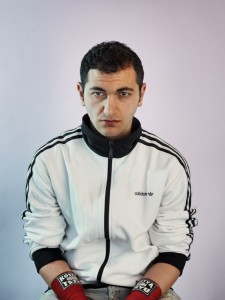I’m Your Man | Belvoir & Sydney Festival
- January 26th, 2012
- Posted in Uncategorized
- Write comment

Mirrors. Bleach-white lights. Posters of hulking rolled shouldered men staring through their sweat. Sounds of leather-fisted thuds. The hiss from clenched teeth. Glaze-focused stares. Inspirational slogans scream,
“The more you sweat the less you bleed.”
We settle into our seats – as much as we can in the full glare of the well lit theatre -and the glare of the performer. Or perhaps ourselves – soft-bellied, neatly dressed, freshly groomed and perfumed.
They. Those performers – bounce, or steam, or sweat, or spar, or move, or crunch. Repeat. Push. Push harder. Repeat. Push. Push harder. Grunt. Breathe. Furrow. Focus. Dodge. Sweat. Spar. Stop. Breathe. Repeat.
Created by Roslyn Oades, I’m Your Man is an embodied, voiced document containing the experience and philosophy of boxers who represent many different generations, nationality, countries and world views. It is a study of language as much as it is a study of a community. A study of personal movtivation – of ambition – of aiming for success and knowing when to concede defeat. Collected from aspiring and legendary boxers including Billy ‘The Kid’ Dib, Wale Omotoso, Gus Mercurio, Jeff Fenech, Tony Mundine, Wally Carr and an unknown trainer “CJ.”
Despite the blurb for this show focusing on the following/documenting of Billy ‘The Kid’ Dib’s journey through his preparations for a world-title fight – the show itself is not a single portrait but more like a mirrored mosaic: at times amusing, at times deeply philosophical, sometimes surprising. This is tough talk from tough guys. Guys who talk about money, fame, pride, strength. But not often about fear or defeat. The hype and the slogans plastered across the walls of the theatre see to be truly believed and provide focus. This is a study of the men of this world – and a fascinating achievement to be let into this world.
However, the true vulnerability – the ugly, nasty and difficult side of contemporary boxing is only lightly touched upon. There’s no shortage of bright-eyed dreaming, posturing, bravado – but not a lot of the flip-side, with the exception of one of John Shrimpton’s characters who talks about the loss of his family and what is personally at stake.
The performance technique is fascinating – “the actors wear earpieces and take their lines directly from the ringsides, gyms and dressing rooms of Oades’ recordings” but I wonder how effective this technique is, after the show has been performed many times? Surely this is more effective as a rehearsal/character building technique than a live performance technique? That being said, the headphones gave a visual effect of the idea that every man is in his own world, and locked off from their surrounding environment – a kind of forced focus, which in itself is an interesting idea. The uniqueness of voice is inescapable. Any attempt to replicate will always have an element of parody or adoption. And this technique raises a lot of questions about the actor’s voice – and what vocal adoption is. Replicating speech patterns can often be achieved by first hand expose – surely that, paired with a well notated, thorough verbatim text (complete with all ums, ahs, stutters, coughs, breaths, utterances) would have achieved a similar result?
The performances are delivered with complete commitment by Michael Mohammed Ahmad, Billy McPherson, Katia Molino, Justin Rosniak and John Shrimpton – as they perform beyond their natural voices, their skin and their background and gender.
I’m fascinated by this world and two years ago started becoming quite enthralled by UFC – a vicious form of fighting known also as Mixed Martial Arts – mainly because I found this such a confronting concept – men confronting men of differing techniques with the view of knocking out the opponent. This is not like the (comparatively) gentlemanly sport of boxing. I became fascinated with male aggression – the triggers – the celebration of.
Here’s some UFC for those interested…
And now for a Fenech montage…
I’m Your Man is interesting, not because of the technique employed – but the research generated. Any hidden world, any niche world, any personal world has an innate dramatic tension. What is surprising about the show is how charming the interviewees are. How willing they were to talk with Oades. Mercurios ageless advice to keen your head down and hands up – head down to keep going, hands up to protect yourself is probably the most important message to the audience. The moment of being truly moved happened in the 4 minutes in which the whole cast were silent – the last few moments of the performance – where all that talk and bluster and posturing, comes down to a quiet individual moment of focus- as Dib sets his sights before the battle. It is that moment where something pure and clear, and vulnerable transformed in that performance and in that performer. The noise in his ears stopped. He held the light in his eyes. His jacket glinting with an optimistic showiness. And it was beautiful.